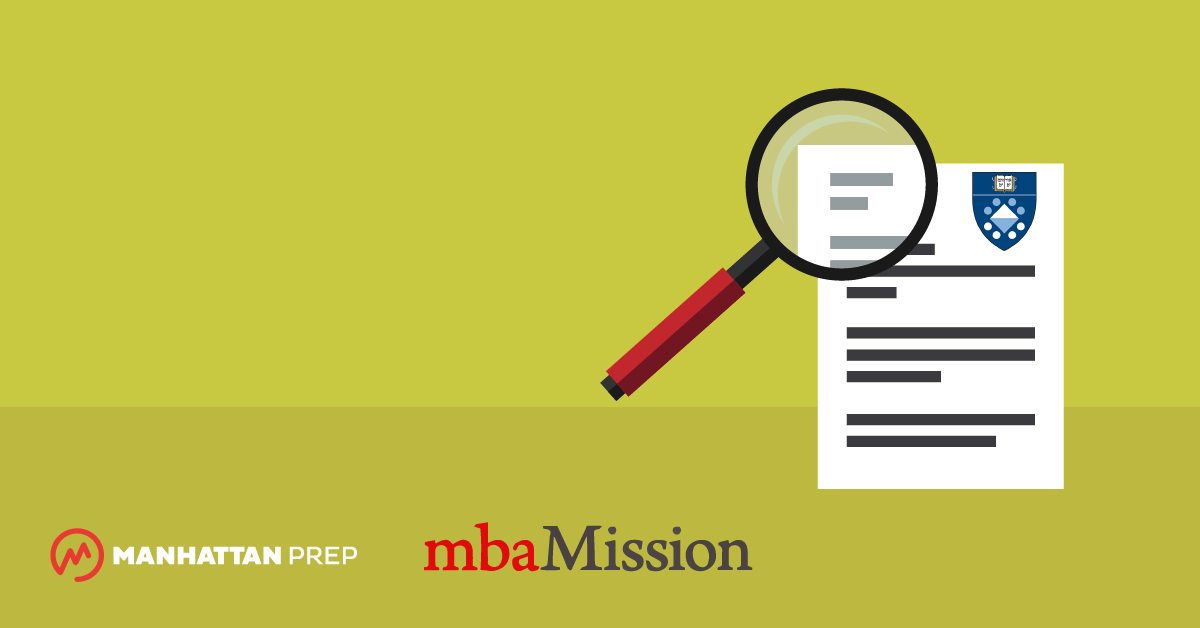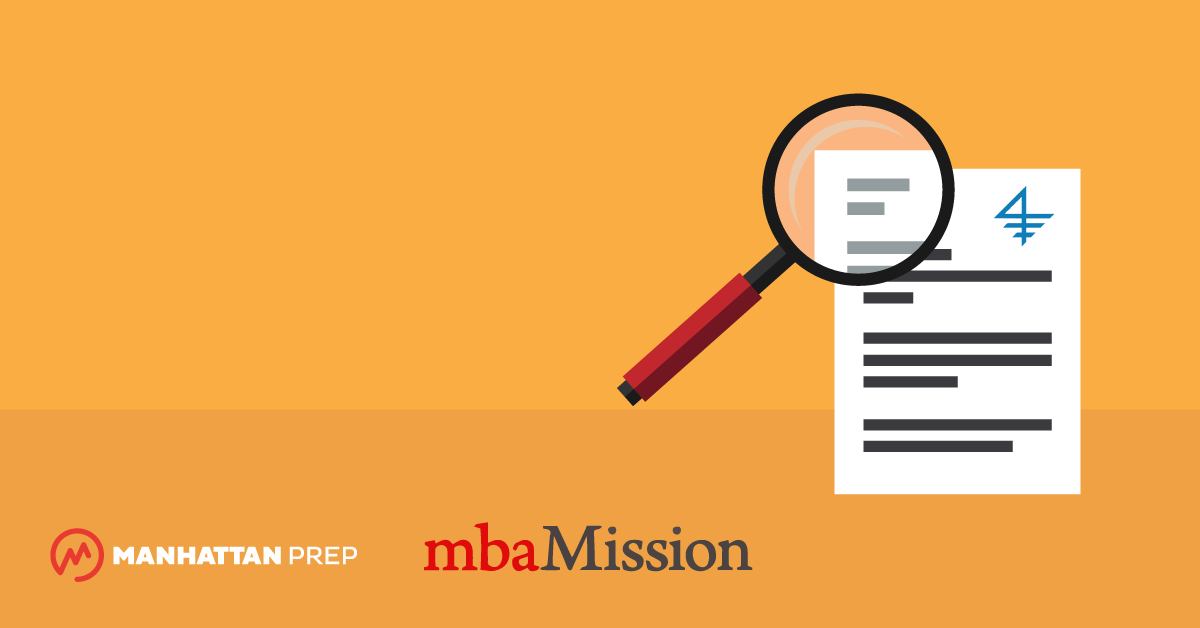Avoiding MBA Essay Pitfalls

Each week, we are featuring a series of MBA admission tips from our exclusive admissions consulting partner, mbaMission.
Understandably, b-school candidates have an almost endless number of questions about how to master their MBA essay. Here, we present our advice on several facets of this challenging portion of the MBA application, in hopes of helping you craft compelling submissions that will stand out to the admissions readers. Read more
Know the GMAT Code: Work Fast on IR Table Problems

Guess what? You can attend the first session of any of our online or in-person GMAT courses absolutely free—we’re not kidding! Check out our upcoming courses here.
In today’s latest installment of our Know the Code series, we’re going to talk about the most efficient way to tackle Table problems in the Integrated Reasoning (IR) section of the GMAT.
First, try out this IR Table problem from the GMATPrep® free practice exams. A timing note: If you’re planning to guess on 3 questions in the IR section, then you can give yourself 3 minutes and 20 seconds to do this problem.
And a logistics note: On the real test, you’ll be able to sort by the different columns in the table. That’s not possible in a blog article, so just do your best as is, but note that a question like this one can be done in much less time than 3 minutes and 20 seconds if you’re taking advantage of the ability to sort the data. Read more
Yale School of Management Essay Analysis, 2017-2018

How can you write essays that grab the attention of MBA admissions committees? With this thorough analysis, our friends at mbaMission help you conceptualize your essay ideas and understand how to execute, so that your experiences truly stand out.
The Yale School of Management (SOM) is staying the course this year with its single application essay, joining both Harvard Business School and Columbia Business School in using the same essay queries as last season. The school has made no modifications to its one prompt, whose 500-word limit does not offer a lot of room to make an impression on the admissions committee. Having commented last year in a Yale SOM blog post that the “seemingly simple and straightforward question” was composed with assistance from one of the school’s organizational behavior professors, Assistant Dean and Director of Admissions Bruce DelMonico added in a more recent post that the admissions committee “is interested not just in the commitment itself but also in how you [applicants] approach the commitment and the behaviors that support it.” Clearly, the Yale SOM has invested some truly purposeful effort into constructing a query that will reveal something specific from and about the individuals targeting its MBA program. In our Yale School of Management essay analysis, we explore how you can maximize your opportunity to shine with this forthright prompt… Read more
Harvard Business School Essay Analysis, 2017-2018

How can you write essays that grab the attention of MBA admissions committees? With this thorough analysis, our friends at mbaMission help you conceptualize your essay ideas and understand how to execute, so that your experiences truly stand out.
Last year (after just one season), Harvard Business School (HBS) did away with its incredibly broad “introduce yourself” essay prompt in favor of one that at first glance seemed to have almost no parameters at all—and, interestingly, was more or less the same as the one from 2013–2014, when Dee Leopold was running the show. Now with a full year under his belt as HBS’s director of admissions, Chad Losee must feel that the essay question was effective in eliciting the kind of information the admissions committee finds valuable in evaluating the program’s potential students, because it remains exactly the same this year. Read on for our Harvard Business School essay analysis for the program’s 2017-2018 prompt and advice on the best way to approach it… Read more
What Your Math Teacher Didn’t Tell You About PEMDAS

Did you know that you can attend the first session of any of our online or in-person GMAT courses absolutely free? We’re not kidding! Check out our upcoming courses here.
Here’s a phrase that might bring back some memories from middle school math class: Please Excuse My Dear Aunt Sally, or PEMDAS. (If you went to school outside of the U.S., you may have learned the acronym BEDMAS or BODMAS, instead.) You use this phrase to decide what order to do mathematical operations in: Parentheses first (from inside to outside), then Exponents, then Multiplication and Division (left to right), then Addition and Subtraction (also left to right).
PEMDAS isn’t terribly fancy stuff. It’s just a useful little tool that helps us communicate clearly—it’s what tells us, for instance, that “2x(3+4)” means something different from “2×3 + 4.” But if there’s one thing the GMAT loves, it’s making things look more complicated than they really are. Read more
MBA Admissions Myths Destroyed: If I’m Not Accepted in Round 1, I’ll Just Apply in Round 2

What have you been told about applying to business school? With the advent of chat rooms, blogs and forums, armchair “experts” often unintentionally propagate MBA admissions myths, which can linger and undermine an applicant’s confidence. Some applicants are led to believe that schools want a specific “type” of candidate and expect certain GMAT scores and GPAs, for example. Others are led to believe that they need to know alumni from their target schools and/or get a letter of reference from the CEO of their firm in order to get in. In this series, mbaMission debunks these and other myths and strives to take the anxiety out of the admissions process.
As you enter the upcoming application season, what kind of strategy do you have in mind? More than a few candidates, having likely read about the supposed advantages of applying in Round 1 on various websites and discussion boards, plan to submit all their applications in Round 1—with the idea that if no acceptances are forthcoming, they will just submit another set of applications in Round 2. If this is your plan, we would like to explain why it is probably not your best course of action. Read more
Un-Educated Guessing on the GMAT

Did you know that you can attend the first session of any of our online or in-person GMAT courses absolutely free? We’re not kidding! Check out our upcoming courses here.
As any good GMAT student knows, you can’t possibly answer every question correctly. In fact, if you get the first couple questions right, you will rapidly get into territory where most people can hardly figure out what the questions mean. And if you take extra time to dig into those questions and try to figure them out, it bites you in a big way when you run out of time toward the end. So we quickly learn that if you can’t figure out a good plan to solve a problem, you need to go ahead and take an educated guess.
Sounds great, but it’s not actually that simple, is it? Read more
My GMAT Class Just Ended—Now What?

Did you know that you can attend the first session of any of our online or in-person GMAT courses absolutely free? We’re not kidding! Check out our upcoming courses here.
AKA – I don’t feel ready to take the GMAT, please help!
Let’s say you spent the last few months of your life enrolled in our GMAT class. You attended all the classes and you kept up with homework (mostly)—but you don’t feel ready to take the test yet. You’re starting to panic. What should you do? Read more
MBA Admissions Myths Destroyed: They Will Not Notice My Weakness!

What have you been told about applying to business school? With the advent of chat rooms, blogs and forums, armchair “experts” often unintentionally propagate MBA admissions myths, which can linger and undermine an applicant’s confidence. Some applicants are led to believe that schools want a specific “type” of candidate and expect certain GMAT scores and GPAs, for example. Others are led to believe that they need to know alumni from their target schools and/or get a letter of reference from the CEO of their firm in order to get in. In this series, mbaMission debunks these and other myths and strives to take the anxiety out of the admissions process.
Our clients frequently ask, “If I write the optional essay about my [low GMAT score, low GPA, bad semester in college, long stretch of unemployment, etc.], will it call attention to that weakness and overemphasize it?” In short, no. Writing the optional essay about a weakness will instead allow you to control the narrative and thereby better mitigate any negative effects of that weakness.
The admissions committee very likely will take note of a low GMAT score or a low GPA and will be left with unanswered questions about that weakness if you do not use the optional essay to address the issue. Rather than putting the committee in the position of having to guess at an explanation, take control of the situation and grab the opportunity to explain the details behind the weakness. Read more
Columbia Business School Essay Analysis, 2017-2018
 How can you write essays that grab the attention of MBA admissions committees? With this thorough analysis, our friends at mbaMission help you conceptualize your essay ideas and understand how to execute, so that your experiences truly stand out.
How can you write essays that grab the attention of MBA admissions committees? With this thorough analysis, our friends at mbaMission help you conceptualize your essay ideas and understand how to execute, so that your experiences truly stand out.
For years, Columbia Business School (CBS) has been at the front of the pack of MBA programs that have been gradually shortening their application essays and requiring candidates to be direct and concise in their submissions. It was even the first school to incorporate a micro essay into its application. Last season, CBS gave applicants a bit more wiggle room with the essays, increasing the word count for each by a pretty significant margin (up to 100% in one case), but it has tightened the reins back down for this year’s applicants. Still, with a goal statement, three required essays, and an optional essay, you should have plenty of opportunities to convey a well-rounded impression of yourself for the admissions committee. Read on for our Columbia Business School essay analysis for the program’s 2017–2018 prompts… Read more